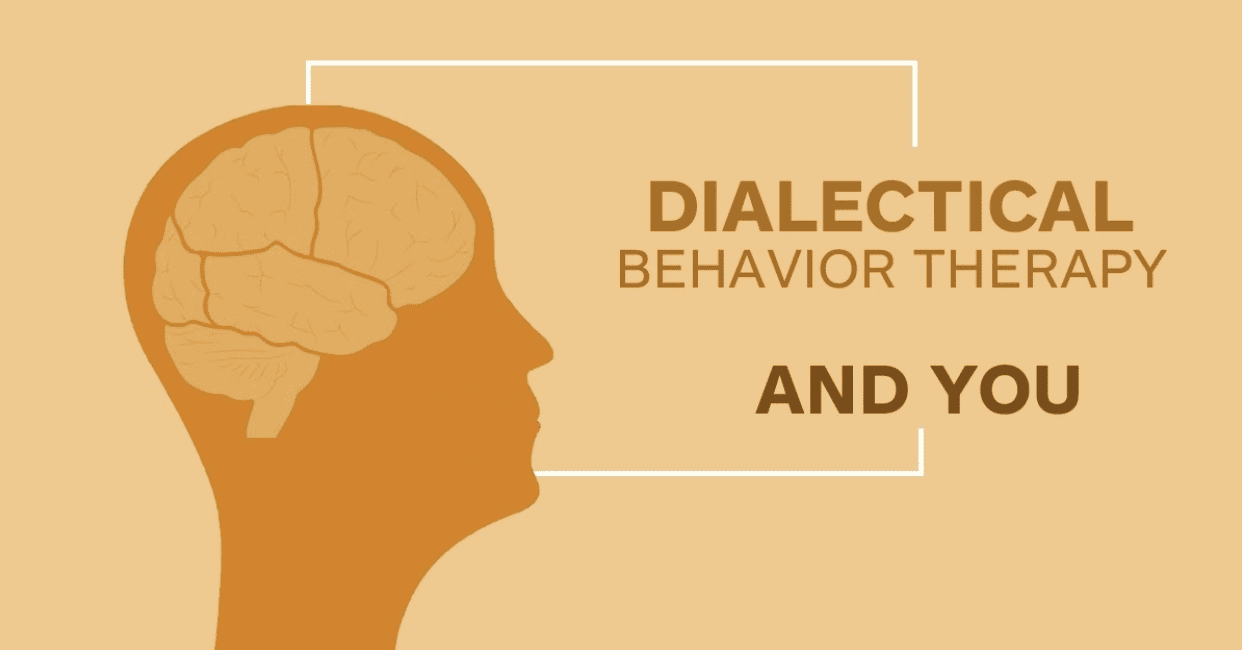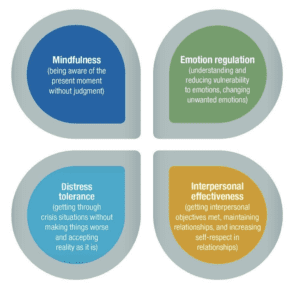
Dialectical Behavior Therapy (DBT) is a type of evidence-based behavioral therapy that aims to identify and change unhealthy or destructive behaviors.
The core idea of behavioral therapy is that behaviors are learned, and therefore when they aren’t healthy, they can be changed. These types of therapy also tend to focus primarily on current problems someone is experiencing, so they can make changes.
What is Dialectical Behavior Therapy?
While dialectical behavioral therapy has many things in common with other types of behavioral therapy and especially CBT, it also has unique elements that set this approach apart. It can be described as a sub-type of cognitive-behavioral therapy. 
The goal of dialectical behavioral therapy is to help people learn how to regulate emotions, have healthier relationships, cope with stress in practical ways, and live in the present.
Someone who has self-destructive behaviors, such as a person with a substance use disorder, can benefit from DBT, as can a person who has a hard time regulating their emotions; it’s also used with PTSD.
Objectives of dialectical behavioral therapy can include:
- Move from being out of control to in control. You might be able to reduce harmful behaviors by becoming more in control in all areas of your life.
- Learn to be able to experience healthy relationships rather than avoiding them or being emotionally unavailable.
- Develop problem-solving skills that can be applied in daily life.
- Accepting negative emotions exists but being able to still feel like a fulfilled person.
What can you expect with DBT?
If you’re participating in a DBT treatment program, there might be individual therapy sessions and group sessions focused on developing more specific skills.
For example, you might start your journey working with a DBT therapist one-on-one, this will help you begin to learn how to apply DBT skills. Then, you can put those skills into action during group sessions.
When you’re doing a DBT group session, you can support one another and share experiences. These groups are led by a therapist, even though they aren’t one-on-one.
DBT may involve homework assignments too. For example, you may be asked to practice exercises to help with mindfulness.
Group sessions usually occur once a week, or maybe a couple of times a week for around six months.
There are also variations in how DBT is delivered. For example, the sessions might be done by phone or video conferencing. DBT can also include just one-on-one therapy without the group sessions, or you could do the alternative and only participate in groups.
Why is Dialectical Behavioral Therapy Effective?
As was mentioned, DBT was initially created to help treat borderline personality disorder, which is characterized by strong negative emotions that are hard to manage.
These emotions often come when someone diagnosed with borderline personality disorder interacts with other people in their lives, such as their family members or romantic partners. These intense emotions lead to conflict.

The goal of DBT is to help create a sense of balance, particularly in your emotions. You move away from seeing things as all-or-nothing or entirely black-and-white, promoting acceptance.
Strategies Used in DBT
The following are some of the specific techniques commonly used in DBT skills training by DBT therapists.
Mindfulness
When you participate in DBT, you learn mindfulness skills, so you’re grounded in the present. This means you’re always thinking about what’s happening both inside your mind and body at any given time, but you’re also using your senses for what’s around you.
Mindfulness can be an important component of addiction treatment and making progress in mental health disorders because it helps you slow down and work on using the coping skills you learn, rather than jumping straight into impulsive behavior or negative patterns.
Tolerance for Distress
When you develop skills for distress tolerance, you can start to handle crises in a better way. Some of the ways you might be taught to do this in DBT include distraction, self-soothing, and working to improve the moment. If you have strong emotions, you can use these distress tolerance techniques to cope better.
Interpersonal Effectiveness
As was mentioned, a lot of what’s worked on in DBT focuses on interpersonal relationships. With interpersonal effectiveness, you can start to learn how to communicate in a healthy way, respect your personal boundaries when it comes to relationships, and create more positive bonds with others.
Emotional Regulation
When you have strong negative emotions, it’s difficult to navigate the situation. Through DBT, you can learn how to identify those emotions and cope with them for more positive outcomes. You might engage in the opposite action as part of this. For example, if you’re feeling depressed and you’d like friends and family, you might learn to do the opposite and instead reach out for social connection during these times. You can bring opposite feelings or forces together with the ultimate goal of creating balance.
Dialectical Behavioral Therapy in Addiction Recovery
DBT can be helpful for the treatment of substance use disorders because it’s a means to help equip people with the tools they need to have healthier emotions and mindsets.
One premise behind DBT is that someone who engages in self-destructive behaviors, which can include substance use, doesn’t have the necessary skills to create a fulfilling life, but they can learn those skills.
Participating in DBT does require a time commitment because you do therapy sessions and homework. However, learning these skills can be an excellent option if you’re in addiction recovery, and they can help you thrive in your daily life.
Many people in addiction recovery find that they struggle to cope with negative emotions and stress, which can increase the likelihood of relapse. DBT can help you implement strategies to reduce the risk of relapse.
In addiction recovery, a lot of people also have to work to rebuild damaged relationships, and DBT helps you learn strategies to do that also.
Types of Behavioral Therapy
There are a few types of behavioral therapy; their effectiveness is evidence-based and well-supported by research. These types of therapy include:
- Dialectical behavioral therapy: DBT helps participants learn new skills to deal with painful emotions. DBT can also be used as a way to reduce relationship conflict. It was originally developed to treat people with borderline personality disorder. Research has shown it’s effective in treating many other conditions, including substance abuse, bipolar disorder, and depression.
- Cognitive-behavioral therapy: CBT is similar in many ways to DBT. This treatment focuses on quality of life and how your thoughts influence your behavior and mood. It’s a problem-solving approach.

- Aversion therapy: Sometimes aversion therapy is used in the treatment of substance abuse. It helps people learn to associate a stimulus with something very unpleasant that causes discomfort. For example, you might learn to associate drinking alcohol with an unpleasant feeling or memory.
- Desensitization: This type of behavioral therapy can help treat phobias. The first step in this process is usually learning relaxation techniques, as well as therapeutic breathing strategies. Then, the therapist can slowly introduce something the client is afraid of in increasing doses while they use the learned relaxation techniques.
Who Benefits from Behavioral Therapy?
Behavioral therapy is considered to be very effective and beneficial for many conditions. These include:
- Substance misuse
- Anxiety disorders
- Bulimia
- Anger control
- Depression
- Suicidal ideation
- Self-harm
Anchored Tides Recovery is proud of the strides and progress we have made with the use of Dialectical Behavior Therapy for our treatment of borderline personality disorder and substance use disorder. The skills you will learn in DBT training will help you all of your life and in many different areas of your life. If you’re interested in learning more about DBT, call one of our care coordinators today.



























